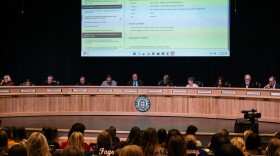The Bush administration suffered another dramatic loss in court on Tuesday over its handling of Guantanamo detainees. For the first time, a federal judge has ordered a group of detainees released, not just out of prison, but into the United States.
The detainees are 17 Chinese Muslims, known as Uighurs, who've been held at Guantanamo Bay in Cuba for nearly seven years. In June, a largely conservative panel of the federal appeals court in Washington ruled in the lead case that the Uighurs are not hostile to the U.S., that they are in fact pro-Western and that the intelligence the Bush administration had provided to justify their detention was not backed up even by reliable hearsay. The court sent the case back to the district court with specific authority to release the men.
That was in June. In a landmark ruling on Tuesday, the federal judge now in charge of the case, Ricardo Urbina, ordered the Uighurs released into the U.S. He said whatever authority the government once had to detain the men has ceased. The Constitution, he observed, forbids indefinite detention without charge.
Judge Urbina ordered the government to produce the men in court. He sternly rejected the government's contention that it could put the men in prison once they are transferred from Guantanamo. But, he said he would hear from the Department of Homeland Security about any conditions it wishes to impose.
The most likely place for the men to live would be in Northern Virginia, where a Chinese Muslim association has found 17 families to take them, at least for the time being.
The U.S. government has conceded that the men would be tortured if they are returned to China. The Chinese government sees the Uighurs as a threat because many of them want greater autonomy from Beijing.
The Chinese government on Tuesday demanded that the men be sent back there.
No other country has been willing to take the men for fear of reprisals from China.
Judge Urbina refused to stay his order on Tuesday.
The government can now go to the appeals court, or if it fails there, to the Supreme Court, in its attempt to block the release. The Bush administration contends that even if, as here, detainees are found not to be enemy combatants, the courts lack the power to order their release.
Copyright 2022 NPR. To see more, visit https://www.npr.org. 9(MDAzMjM2NDYzMDEyMzc1Njk5NjAxNzY3OQ001))






